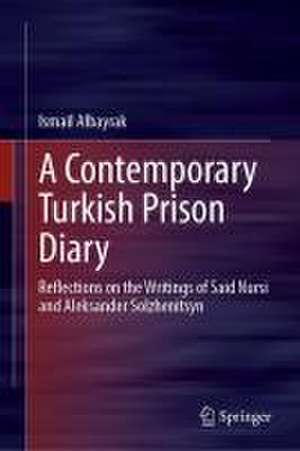A Contemporary Turkish Prison Diary : Reflections on the Writings of Said Nursi and Aleksander Solzhenitsyn
Autor Ismail Albayraken Limba Engleză Hardback – 12 apr 2024
Preț: 640.24 lei
Preț vechi: 753.22 lei
-15% Nou
Puncte Express: 960
Preț estimativ în valută:
122.51€ • 131.01$ • 102.15£
122.51€ • 131.01$ • 102.15£
Carte tipărită la comandă
Livrare economică 18 aprilie-02 mai
Preluare comenzi: 021 569.72.76
Specificații
ISBN-13: 9789819715633
ISBN-10: 9819715636
Ilustrații: XX, 144 p. 1 illus.
Dimensiuni: 155 x 235 mm
Greutate: 0.41 kg
Ediția:2024
Editura: Springer Nature Singapore
Colecția Springer
Locul publicării:Singapore, Singapore
ISBN-10: 9819715636
Ilustrații: XX, 144 p. 1 illus.
Dimensiuni: 155 x 235 mm
Greutate: 0.41 kg
Ediția:2024
Editura: Springer Nature Singapore
Colecția Springer
Locul publicării:Singapore, Singapore
Cuprins
1. Said Nursi and Aleksander Solzhenitsyn: Chronologies of prison experiences.- 2. Prison Spirituality and Inner Peace.- 3. Contemporary Turkish Prison Experience.
Notă biografică
Ismail Albayrak is a professorial fellow at Australian Catholic University. He has taught and written on Qur’anic studies (both classical and contemporary approaches to the Qur’an), interfaith dialogue, and orientalism. He is also interested in the place of Muslim communities and their activities in a globalizing world, where interfaith dialogue is becoming increasingly more essential. His most recent research focuses on the Ibadi tradition, the relationship between sounds and meaning in the Qur’an, classical prison literature in Islamic societies, and the status of women in Islamic traditions.
Textul de pe ultima copertă
This book explores the religious experiences of two notable figures who endured severe trials under authoritarian regimes: Bediuzzaman Said Nursi (1877–1960) within the Islamic tradition, and Aleksander Solzhenitsyn (1918–2008) within the Russian Orthodox Christian tradition. Against the tumultuous backdrop of the twentieth century’s spiritual, social, political, and intellectual upheavals, both Nursi and Solzhenitsyn grappled with immense hardships because of their beliefs. Despite immense tribulations, both individuals demonstrated unwavering faith and resilience in the face of adversity, continuing their scholarly and literary activities. The current study centers on the dichotomy of spiritual confinement and expansiveness, illustrating how people can experience spiritual distress even without physical restraints. It explores the historical and conceptual aspects of imprisonment within Christian and Muslim perspectives, explores the reasons for Nursi and Solzhenitsyn's incarceration, examines their coping mechanisms in the face of hardship, and underscores the role of faith and spirituality. The author integrates personal experiences, particularly his own incarceration during the aftermath of the 2016 Turkish staged coup attempt, within the context of the narratives of Nursi and Solzhenitsyn. The book addresses court proceedings, release, departure from Turkey, and resettlement in Australia. Throughout, the author draws parallels between their own observations and those of Nursi and Solzhenitsyn, contributing to the broader discourse on individual spirituality and collective consciousness. The book offers insights into spiritual resilience in the face of adversity, utilizing the lives of these figures to illuminate shared human experiences. A unique collation of personal narration and scholarly reflection, it is relevant to academics and students in history, political science, sociology, Islamic and Middle Eastern studies, and to social scientists researching the phenomenon of exile and prison in different countries across the world. It also speaks to the work of activists and policymakers in human rights.
Caracteristici
Unites comparative theological approaches through the works of two twentieth century Muslim and Christian scholars Addresses the intrinsic correlation between imprisonment and the concepts of tranquility and inner peace Presents an inaugural endeavor to engage with a firsthand personal experience of the Turkish coup of 2016
